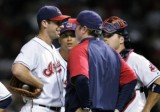Q. So does this explain his Pythagorean failures?
A. Pirata Morado gathered the data for us on Wedge's actual W/L records, vs. what they "should" have been given his runs gained and lost.
Here is the data that Pirata collected:
2003: Indians actual Winning% = 0.420, Pythag = .450, Performance = -0.030
2004: Actual = 0.494, Pythag = 0.501, Performance = -0.007
2005: Actual = .574, Pythag = .596, Performance = -0.022
2006: Actual = 0.481, Pythag = 0.550, Performance = -0.068
2007: Actual = 0.593, Pythag = 0.566, Performance = 0.027
2008: Actual = 0.500, Pythag = 0.526, Performance = -0.026
2009: Actual = 0.401, Pythag = 0.448, Performance = -0.046
.
 Q. Does SSI presume that a ballclub plays +5 or -5 actual wins by luck, or by (anti-)skill?
Q. Does SSI presume that a ballclub plays +5 or -5 actual wins by luck, or by (anti-)skill?
A. In one season, it might or might not be luck. Over a series of seasons -- such as Mike Scioscia's or Eric Wedge's or Earl Weaver's -- we presume that there is a cause to the effect. (We may presume wrong.)
Very, very often Pythag variation is luck -- and it corrects the next season. But sometimes, not.
And you can't just say, "Hey, the 2004 Cubs were over Pythag but the 2005 Cubs weren't, so it was luck." Life isn't that simple. The 2005 Cubs were a different team! How do we know whether the 2004 Cubs weren't on a hot roll for a reason?
Dr. D has been watching loser ballclubs lie down and die, in May, for 30 years. Gutless ballclubs under-perform Pythag, as a group.
...............
Bill James developed Pythag for a reason. He wanted to know which ballclubs had systemic issues with winning or losing. He didn't develop it simply to sit and observe Pascal's Triangle from the bleachers.
.
Q. What is the statistical chance that Wedge's 2003-09 teams lost those extra games by luck?
A. There was a 5.1% chance that Wedge would lose -27 (or more) games to Pythag over those seasons by sheer luck.
(And another 6.4% chance that he would gain +27 or more games vs. Pythag by luck -- so the cumulative chance was about 11% that Wedge's record would deflect from Pythag by 27 games or more over seven seasons).
................
Statisticians will quibble, "Well, 94.9% is just shy of the experimental threshold."
But remember! Completely aside from the 94.9% confidence (in Wedge's futility) given by Pythag, you have:
- 94.9% Pythag, AND
- Wedge's demonstrated skill in Blown Quality Starts (7th or higher every year individually ), AND
- The on-site accusations of terrible bullpen switches
The time comes to stop quibbling. Wedge had a rep for terrible switches, and the facts back that up.
.
Q. In English, Doc. Did Wedge lose those 27 extra games by luck?
A. No. He lost the 27 extra games with lousy bullpen switches.
He was losing 4 games per season to Pythag, and he had 5-6 more blown QS per season than other managers do.
Take 2006, for instance. He had a whopping 14 blown QS, and he was -11 games to Pythag that year.
On the other hand, in 2007 his blown QS were down, and he actually beat Pythag that year.
.
.
Add comment